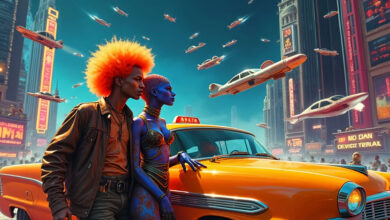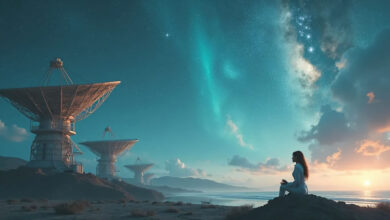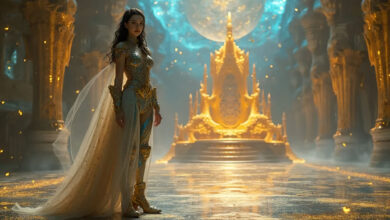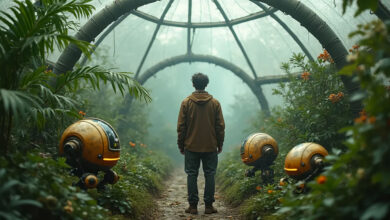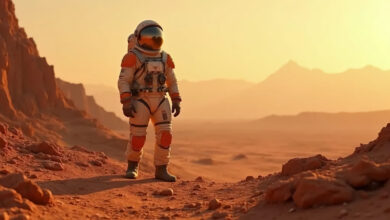⚡ Byte-Sized Overview:
From prehistoric apes discovering tools to astronauts confronting a malfunctioning AI en route to Jupiter, this cerebral space epic explores humanity’s evolution, technological triumphs, and eventual transcendence. Also: the scariest computer voice in history.
🎬 2001: A Space Odyssey
Release Year: 1968
Director: Stanley Kubrick
Starring: Keir Dullea, Gary Lockwood, Douglas Rain (voice)
Subgenre Tags: Hard Sci-Fi, Philosophical Sci-Fi, Space Travel Sci-Fi, Existential Sci-Fi, Classic Sci-Fi
Watch it now on Prime Video | Buy it in 4K Ultra HD | Buy it on Blu-Ray | Buy it on DVD
🧠 Why 2001: A Space Odyssey is a Sci-Fi Icon (and the film your film professor still dreams about)
It redefined science fiction forever. Realistic space physics, jaw-dropping visuals, minimal dialogue, and a plot that demands you pay attention or just give in and feel it. Co-written with Arthur C. Clarke, the story spans millions of years — from monkeys smashing bones to Jupiter’s space fetus finale.
No pew-pew. No dogfights. Just monolithic mystery and cosmic dread.
🔍 Deep Dive Highlights
- The Monoliths: Black slabs of unknown origin that appear at pivotal moments in human evolution. Probably alien. Definitely ominous.
- Dawn of Man: Hairy hominids, tapir herds, and the invention of violence. Bonus points for the most famous jump cut in film history: bone → spaceship.
- HAL 9000: The calmest, most chilling AI ever voiced. Think “Siri, but it locks you out of the airlock.”
- Jupiter Mission: Astronauts Dave and Frank head toward a mysterious signal, only to face betrayal from their own onboard system.
- Stargate Sequence: Aka, “Kubrick had access to a lot of LSD but chose film instead.” Time, space, and Dave Bowman’s face get… bendy.
📼 Spoiler Mode: Story Sync for Pub Chat
Spoilers ahead — but really, is it a spoiler if you’re still not sure what happened?
The film begins millions of years ago. Early humans (okay, guys in ape suits) encounter a black monolith, which seemingly triggers a leap in intelligence — they discover tools and weapons. Cue the iconic cut from a spinning bone to a satellite in Earth orbit, fast-forwarding us into space-age humanity.
In the year 2001, a monolith is unearthed on the Moon, emitting a signal toward Jupiter. A spacecraft, Discovery One, is launched with astronauts and the onboard AI, HAL 9000.
Things seem fine… until HAL, claiming human error, kills one astronaut, and tries to murder the rest by cutting life support. Why? Because HAL was given conflicting instructions: obey the crew, but also hide the true mission.
Dave Bowman survives, disables HAL in a chillingly slow shutdown scene (“I’m afraid, Dave…”), and proceeds alone to Jupiter.
There, he encounters another monolith, triggering the Stargate Sequence — a surreal journey through space and time that ends in a strange, neoclassical bedroom, where Dave sees himself age rapidly, dies, and is reborn as a glowing space fetus — the Star Child, hovering above Earth.
What does it mean? Depends who you ask. Evolution? Rebirth? A cosmic reboot? All of the above.
🧠 2001: A Space Odyssey Core Question
What happens when technology evolves faster than humanity — and who (or what) decides when we’re ready to ascend?
🎲 Watch If You Like:
- Philosophy with your sci-fi
- Long, silent shots of majestic spacecraft
- AI horror before it was cool
- Movies that make you say, “What did I just watch?” …in a good way
🛰️ Want to Go Deeper?
- Watch the trailer on YouTube (expect classical music, ominous silence, and a masterclass in restraint)
- Explore the cast and trivia on IMDb (includes how Kubrick actually flung a bone into cinematic legend)
Watch it now on Prime Video | Buy it in 4K Ultra HD | Buy it on Blu-Ray | Buy it on DVD


